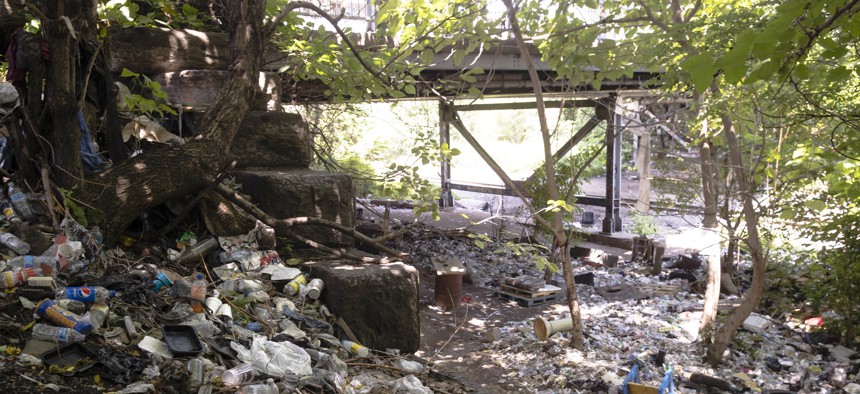Feds File Lawsuit to Stop 'Safe Injection' Site for Drug Users

This July 31, 2017, file photo shows trash including discarded syringes and other rubbish in an open-air heroin market that has thrived for decades, slated for cleanup along train tracks a few miles outside the heart of Philadelphia. AP Photo
A Philadelphia non-profit, with the support of city leaders, has been moving forward with a plan to open a facility where they said drug users could more safely use heroin and other illegal opioids.
The Justice Department followed through Wednesday on its warnings to city and community leaders considering “safe injection” sites as a tool to combat opioid overdoses, making clear the federal government asserts they are illegal and will take steps to intervene.
U.S. Attorney William McSwain in Philadelphia filed a lawsuit against the non-profit organization Safehouse, which has been moving toward opening a space in the city where addicts could inject heroin or other drugs. The group plans to make clean syringes available, while medical staff could watch over users, administering the life-saving drug naloxone if they overdose. Safehouse clients would bring their own drugs to the facility.
The idea is that Safehouse would be a safer place for people to use drugs, as well as perhaps create opportunities to convince people over time to seek help.
But federal officials reject the idea that this model, which has been deployed in British Columbia in Canada and some countries in Europe, will actually work.
“There is no expert consensus that this plan would do any good for anybody,” McSwain said at a news conference, according to his prepared statement. “But here is what we do know: setting up a drug house is illegal.”
Philadelphia isn’t the only city where people have proposed this kind of facility, although Safehouse was on track to become the first injection site operating in the United States. Officials in San Francisco had proposed a pilot project there last year, but then-Gov. Jerry Brown vetoed legislation that would have allowed it to move forward. Lawmakers in California have re-introduced a bill to allow a pilot to happen, according to the San Francisco Chronicle.
Ronda Goldfein, a vice president at Safehouse, said the organization will vigorously defend the concept in court, saying they don’t concede that it is illegal under federal law, according to WHYY. Goldfein told the Philadelphia Inquirer that the organization will present the federal judge deciding the issue with evidence to show that this model can keep people from dying.
“I think that the value of having a court decide this is that it gives both sides the opportunity to present the credible evidence and research that has informed their analysis,” she told the newspaper.
The Inquirer noted that city officials and District Attorney Larry Krasner have been supportive of the injection site, although the money for it has been raised privately and it would be run by a non-profit. "We are not going to prosecute people who are trying to stop people from dying," Krasner told the Associated Press after the lawsuit was announced.
The city’s data shows that more than 1,000 people died from opioid-related overdoses in 2017. A city health office told NPR over the summer they estimate 75 people a year could be saved from dying through this kind of program.
The Justice Department has been vocal for some time about the agency’s opposition to the idea of injection sites. Deputy Attorney General Rod Rosenstein wrote in the New York Times in August that these kind of spaces “are very dangerous and would only make the opioid crisis worse.”
McSwain underscored that his office could have been more aggressive, but instead chose to file a lawsuit against Safehouse before it opened, asking a federal judge to rule ahead of time on the legality of the concept. “We’re not bringing a criminal case right now. We’re not arresting anybody,” he said in an interview with WHYY.
In the lawsuit, the U.S. Attorney’s office argues that the federal Controlled Substances Act specifically prohibits the maintenance of any place for the purpose of using an illegal drug. Supporters of Safehouse have countered that the law doesn't apply to a medical facility.
Laura Maggi is Managing Editor of Route Fifty and is based in Washington, D.C.
NEXT STORY: I Used to Preach the Gospel of Education Reform. Then I Became the Mayor.






